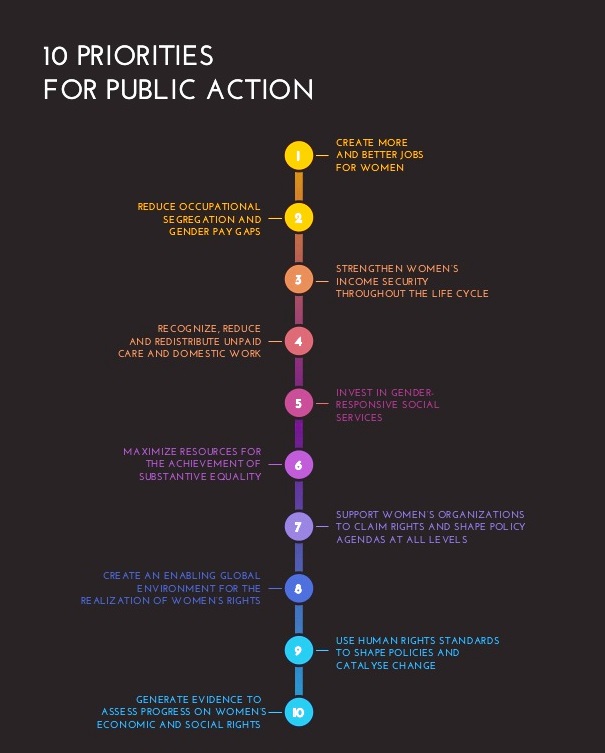UN Women Report “Progress of the World’s Women 2015-2016: Transforming Economies, Realizing Rights” launches in Pakistan
Islamabad – There is plenty of evidence in Pakistan to suggest that girls are regularly outperforming boys in medicine, mathematics, and reading and graduating with top honors from schools and universities. Yet the irony is that globally, across the region and in Pakistan, women are struggling to find work.
The new alternative policy agenda unveiled by the latest UN Women Report brings together human rights and economic policy making to call for far-reaching changes to the global policy agenda that will transform economies and make women’s rights, and equality, a reality. “Progress of the World’s Women 2015-2016: Transforming Economies, Realizing Rights” is a flagship report of UN Women, the United Nations Entity for Gender Equality and the Empowerment of Women.
The Report documents the ways in which current economic and social policies are failing women in rich and poor countries alike, and asks what would the economy look like if it truly worked for women?
H.E. Ms. Heather Cruden, Canadian High Commissioner in her opening remarks said: “We need to challenge the status quo as it is critical to find solutions to understand and uphold women’s rights and gender equality, which will not only make economies work for women, it will benefit societies as a whole”. She highlighted that today, for the first time we see the highest number of women Ambassadors in Pakistan, and are also role models for young girls.
“If the economy really worked for women, (and for the benefit of all), women would have equal access to opportunities and resources – a good job with equal pay, or access to land – and social protection. Women’s life choices would be unconstrained by gender stereotypes, stigma and violence; the paid and unpaid work that they do would be respected and valued. Women would also have an equal say in economic decision-making: from having a voice in how time and money are spent in their households to the ways in which resources are raised and allocated in their national economies” shared Mr. Jamshed Kazi, Country Representative, UN Women Pakistan, in his welcome address at the Report lanuch.
He added: “We know there are major gaps between this vision and the current reality. But this gap is not inevitable – we urgently need to build economies that work for both women and men”.
Progress of the World’s Women investigates what this failure means- and proposes solutions. The report particularly looks at the ‘invisible’ economy of unpaid care and domestic work that anchors all economies and societies. The report also makes the case that the alternative economic agenda it outlines, would not only create fairer societies; it would also create new sectors of employment.
Ms. Khawar Mumtaz, Chairperson, National Commission on the Status of Women speaking on women’s roles and economic development said: “Development and women’s rights are the side of the same coin. We need to work on legislations, policies, ‘growth’ programming and institutional strengthening at every stage and each level”.
The Chief Guest and Honorable Chairperson of the Benazir Income Support Programme, Ms. Marvi Memon, on behalf of the Government of Pakistan said: “We commit to support the findings of UN Women’s flagship report. We also offer our long-term commitment to the progress of the women of Pakistan”.
Eminent speakers during a policy discourse on women’s economic empowerment in Pakistan spoke on “Decent Work for Women” and “Gender Responsive Social Policies and Macroeconomic Policies. Speakers included: Mr. Hanif Channa (Planning and Development Department, Government of Gilgit-Baltistan), Dr. Saba Gul Khattak (World Bank), Ms. Zainab Saeed (Kashf Foundation), Ms. Shahzadi Gulfam (Pakistan’s First female International Peacekeeper in the UN), Ms. Shaza Fatima Khawaja (Member of National Assembly), Ms. Frida Khan (International Labour Organization) and Dr. Aliya Khan (Quaid-iAzam University).
10 Key Recommendations from the UN Women Report:
A holistic insight into this evidence-based report, with the Pakistan country context was presented by UN Women’s Regional Advisor on Women’s Economic Empowerment, Mr. Francisco Cos Montiel, and 10 key recommendations for actions that governments and others can take in order to move towards an economy that works for women, and benefits all.


